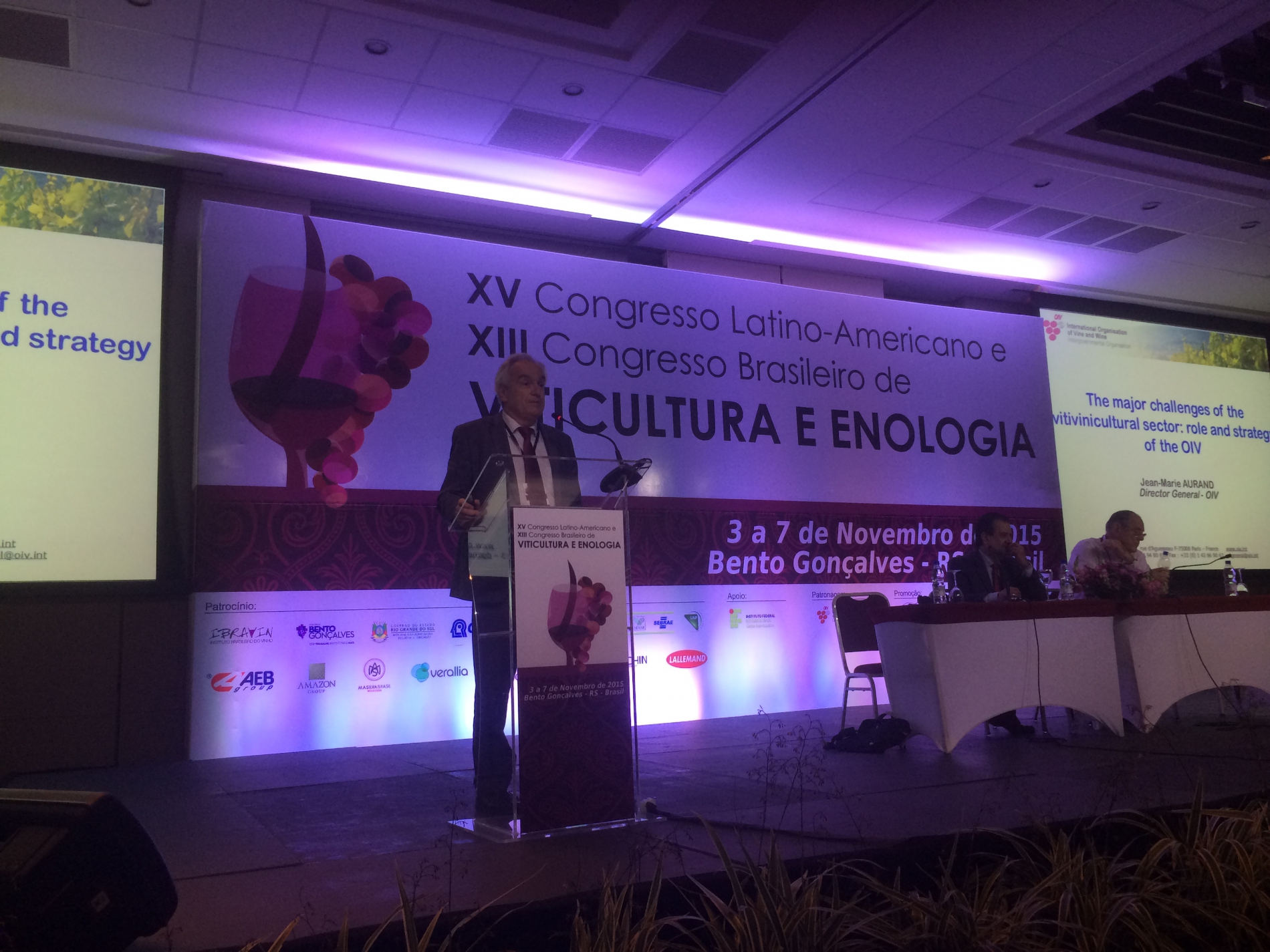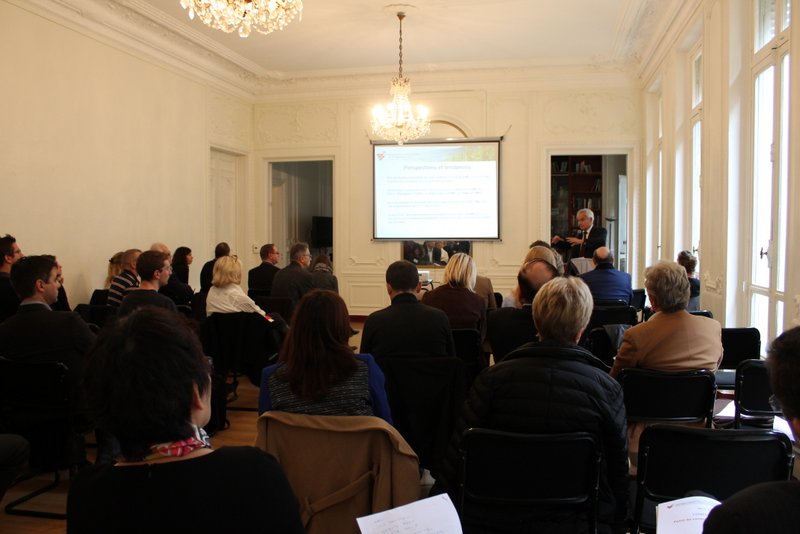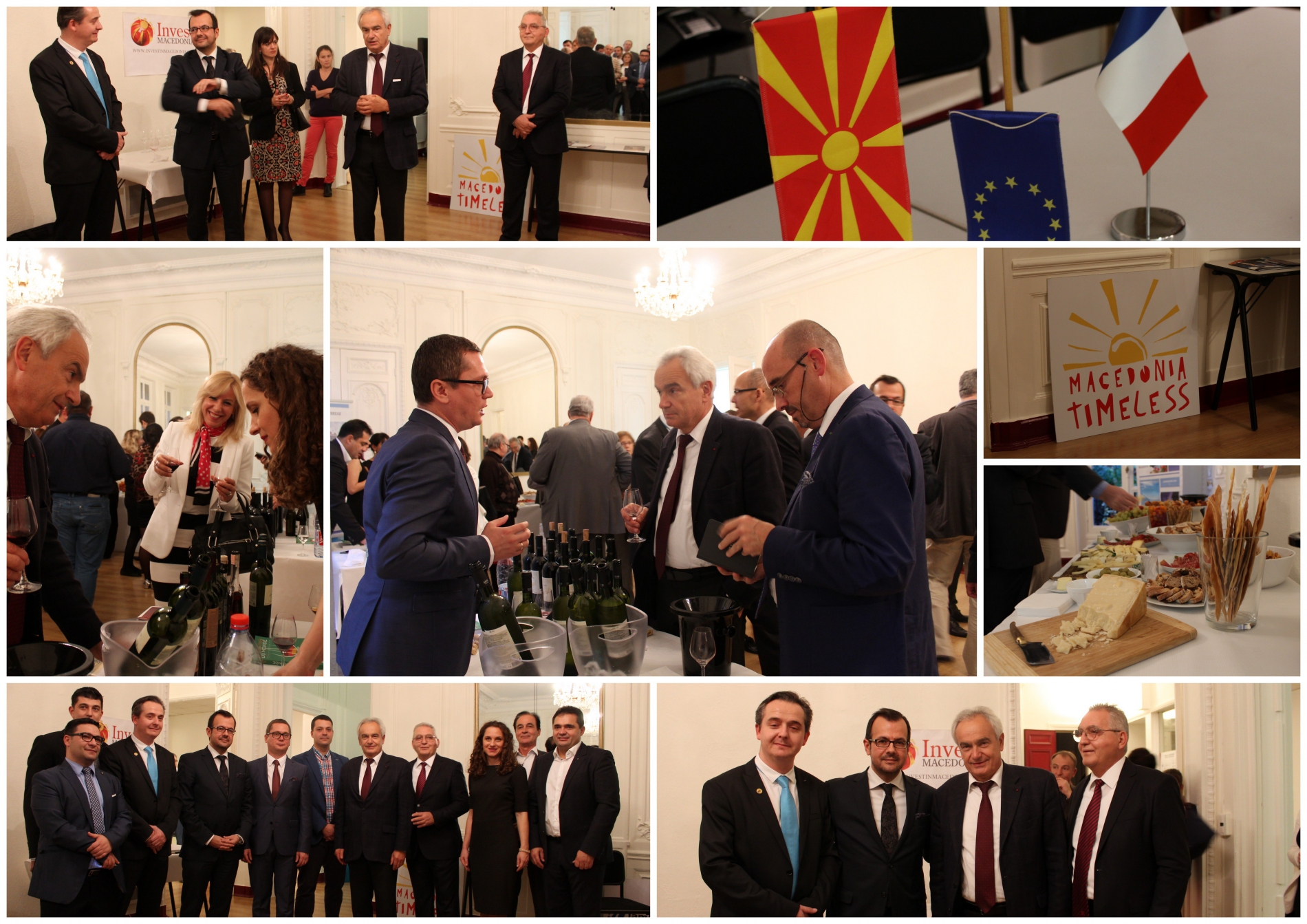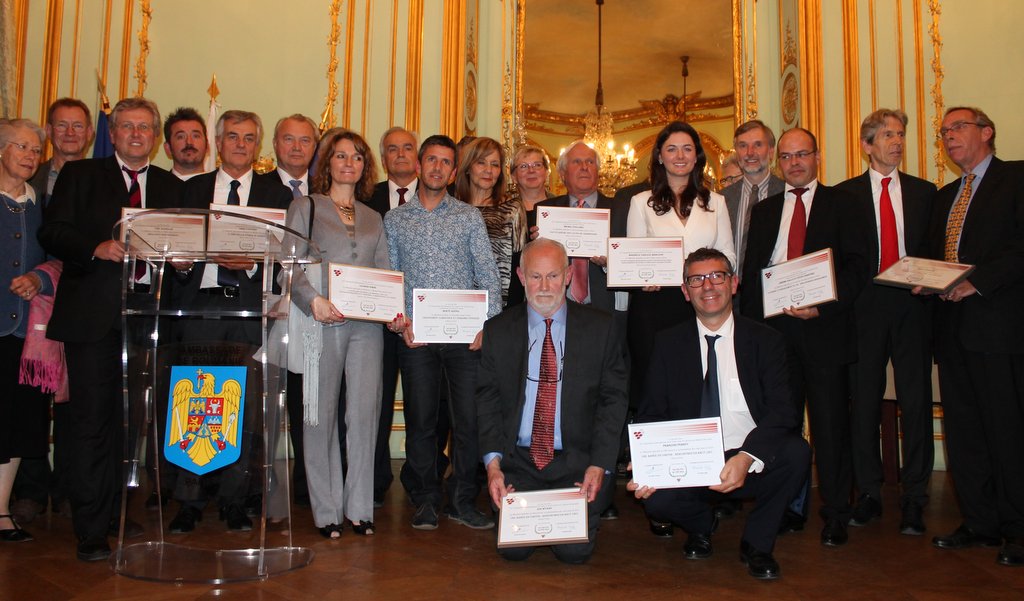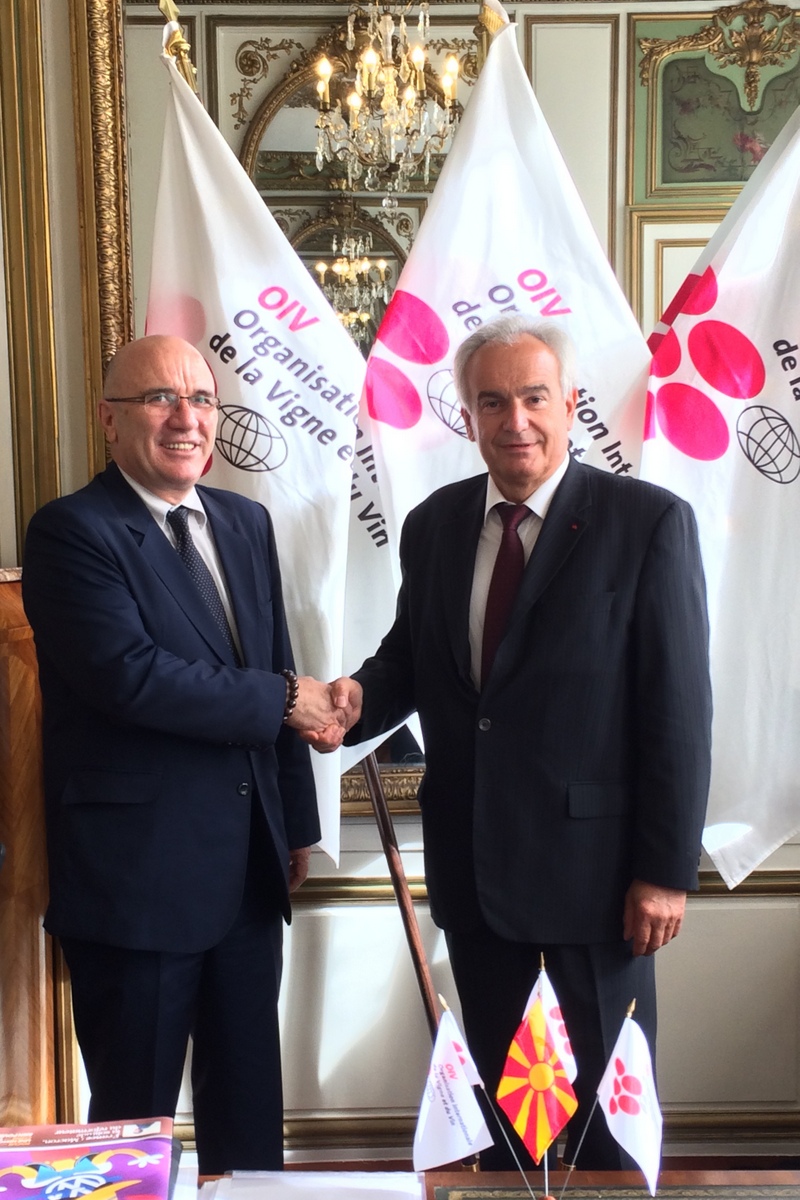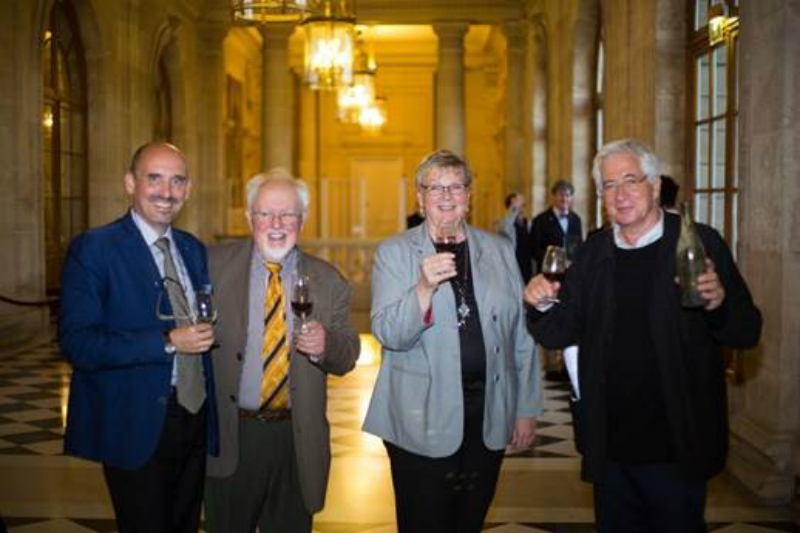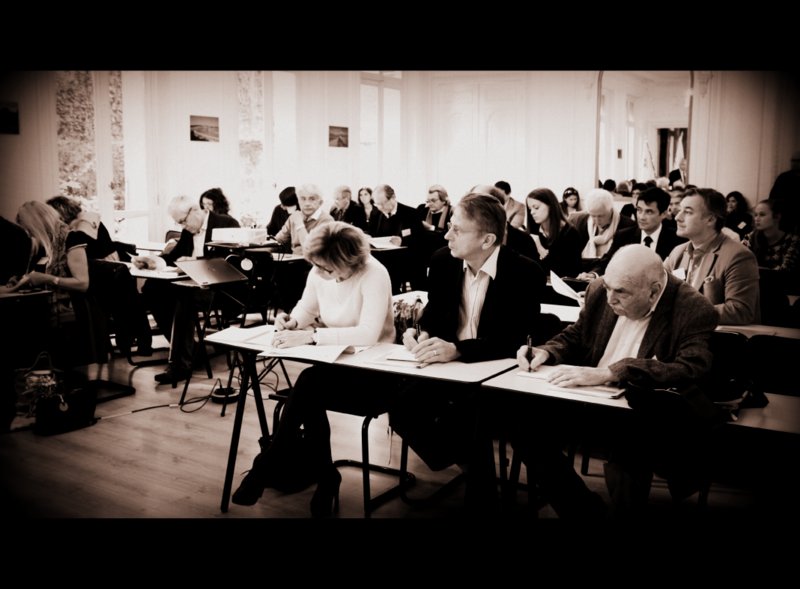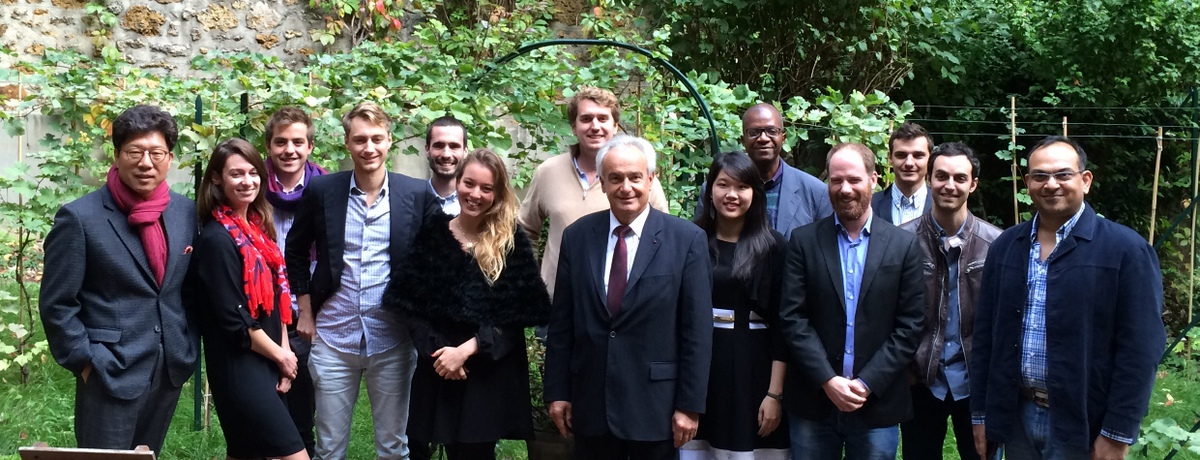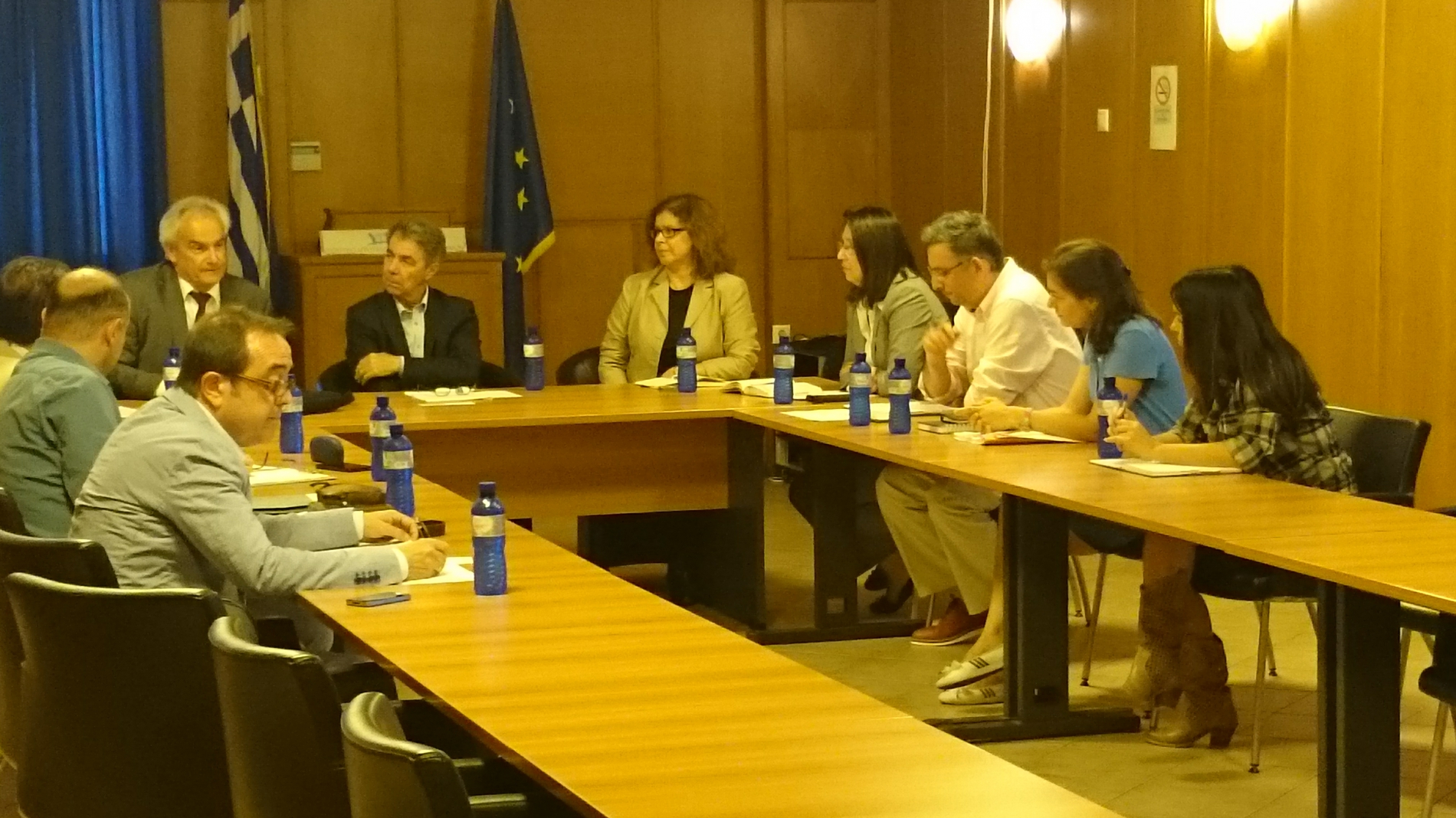06 ноя 2015
More than 500 participants from 11 different countries attended the scientific and technical presentations on the latest vitivinicultural innovations. During this event, placed under the patronage of the OIV, the Director General, Jean-Marie Aurand, presented the state of the vitivinicultural product market and the major trends as well as the key axes of the Organisation's Strategic Plan.During the Congress, Jean-Marie Aurand also had several meetings with the organisers (Ministry of Agriculture represented by the OIV delegate Helder Borges, EMBRAPA, IBRAVIN, PREFEITURA, etc.) of the future OIV Congress scheduled for 23-28 October 2016 in Bento Gonçalves.A meeting with the Governor of the State of Rio Grande Do Sul, who played a significant role in the organisation of the event, took place in Porto Alegre. These meetings demonstrated the Brazilian authorities' strong commitment on all levels to ensuring the complete success of this Congress.
28 окт 2015
Global wine production, excluding juice and musts, is likely to reach 275.7 million hectolitres – a slight increase of 2% compared with 2014, according to the OIV's early estimates. Global economic vitiviniculture data
2015 World wine production estimated at 275.7 mhlWith a slight rise of 2% compared with the previous year, world wine production in 2015 is at a good average
- Italy, with 48.9 mhl, has again become the biggest producer in the world, followed by France (47.4 mhl)
- Spain has returned to an average level of production (36.6 mhl)
- The United States has recorded a high level of production of 22.1 mhl for the second year running (+0.5% compared with 2014)
- In South America, Argentine production has declined (13.4 mhl), while Chile has seen record production (12.87 mhl)
- Australian (12 mhl) and New Zealand (2.4 mhl) production has remained almost stable for 3 years, excluding the exceptional 2014 production in New Zealand
28 окт 2015
The President of the producers association, Mr Svetozar Janevski, expressed his satisfaction with this opportunity to present the diversity of the country – which exports 85% of its production, mainly to neighbouring countries but also to Western Europe, Russia or China – to professionals and to the press.The Director General of the OIV, Mr Jean-Marie Aurand, praised this initiative and the revival of this country's wine market thanks to the investment in vineyards and wineries for the last fifteen years or so, which has enabled the specific characteristics of traditional vine varieties to be expressed through modern techniques that have been developed.With 24,000 hectares of vineyards, the majority of wineries are located in the central part of the country, along the Vardar valley and especially in the Skopje, Tikves and Gevgelija-Valandovo regions.
90% of the 84 wineries for which information was compiled produce less than 50,000 hl, 5 have a production of between 50,000 and 150,000 hl and only 4 produce over 150,000 hl.Of a total production of nearly 1.2 million hectolitres, 60% is red, based predominantly on local vine varieties (Vranec, Kratosija, Prokupec, Kavardaka) or international varieties (Merlot, Cabernet Sauvignon, Syrah, Pinot Noir). White wine is made from varieties such as Smederevka, Temjanika, Zilavka or Rkatsiteli, enabling the production of fresh and fruity wines that perfectly complement the country's Mediterranean gastronomy.More information
26 окт 2015
Wine in Moderation – Art de Vivre (WIM) is a non-profit association founded in 2011 by the European vitivinicultural sector to coordinate the implementation and development – both on a European level and internationally – of the WIM Programme, with the vision of securing responsible and moderate wine consumption patterns as social and cultural norms by spreading the WIM message in Europe and beyond. It has since been extended to Argentina and Chile. This status will enable representatives from WIM to participate in the working sessions of the OIV commissions, sub-commissions and expert groups, as well as to attend the General Assembly.
20 окт 2015
From 55 competing works and 17 countries represented, the OIV Award Jury, which met on 8 July in Mainz in Germany, under the Presidency of Ms Claudia Quini, gave out 9 Awards and 10 Special Mentions from the OIV. Hosted by Mr Oleg Ungureanu, Chargé d'Affaires a.i. of the Romanian Embassy, the Awards Presentation Ceremony took place in the suites of the Hôtel de Béhague. It was attended by numerous representatives from the Diplomatic Corps; President of the OIV Award Jury, diplomat, poet and writer Mr František Lipka; OIV President Ms Monika Christmann; OIV Vice-President Ms Claudia Quini; OIV Director General Mr Jean-Marie Aurand and Scientific Secretary of the Award Jury Mr Jean-Luc Berger.
The 2015 Ceremony received the highest number of applications on record since the OIV Awards were created, confirming the renown and prestige of this international recognition.The rigorous work of many specialised readers who evaluated all of these works gave the International Jury the necessary information to make their decisions, faced with the significant number of works submitted. The authors and publishers were wholeheartedly thanked for their cultural, technical and scientific – or even hedonistic – contributions, each and every one of whose diverse approaches seeks to share a common passion for the vine and wine world.2015 Awards
Prize: Jury awardCategory: Viticulture« La vigne vol. 1 maladies fongiques »Olivier Viret and Katia GindroSwitzerlandAMTRA editionsCategory: Oenology« Le bois & le vin - Les mystères de leur mariage »Roger-Paul DubrionFranceGFA Editions France AgricoleCategory: Literature« Σαν κρασι - san krasi »Maria TzitziGreeceAnubis EditionsCategory: Wine and Health« The Physician, the Drinker, and the Drunk - Wine’s Uses and Abuses in Late Medieval Natural Philosophy »Azelina Jaboulet-VercherreBelgiumBrepols Publishers EditionsCategory: Discovery and presentation of wines« Vins de feu »Charles FrankelFranceDunod EditionsCategory: Wines and Terroir « Vinlandet Frankrike »Britt Karlsson textes und Per Karlsson photographiesSwedenCarlssons Bokförlag EditionsCategory: Specialised studies« Les parfums du vin »Richard PfisterSwitzerlandDelachaux and Niestlé EditionsCategory: Acts of Symposia« La economía del vino en españa y en el mundo »Raoul Compés López and J. Sebastián Castillo ValeroSpainCajamar Caja Rural, servicio de publicaciones EditionsCategory: Encyclopedias« Wine Science - Principles and Applications »Ronald S. JacksonUnited States of AmericaElsevier Editions
Award: Special MentionCategory: Viticulture« Biologischer Weinbau »Uwe HofmannGermanyUlmer Editions« Changement climatique et terroirs viticoles »Coordinator Hervé QuénolFranceLavoisier EditionsCategory: Oenology« Le SO2 en œnologie »Jacques BlouinFranceDunod EditionsCategory: Vitivinicultural Economy« Economie et management du vin - Wine Business Management »Jérôme Gallo und Steve ChartersFrancePearson France EditionsCategory: History and Fine Arts« La Revolución Vitivinícola en Mendoza, 1885-1910. Las transformaciones en el territorio, la arquitectura y el paisaje »Liliana GiriniArgentinaUniversidad de Mendoza Editions« Il vino nella storia di Venezia »Carlo Favero, Coordinateur du collectifItalyBiblos EditionsCategory: Discovery and Presentation of Wines« Une année en CORTON - Rencontres en haut lieu »Jon Wyand photography, François Perroy textsFranceGlénat EditionsCategory: Wine and Food« 50 Vini di Romania incontrano 50 piatti italiani d’eccellenza - Vinuri românesti întâlnesc 50 preparate culinare italiene »Marinela Vasilica ArdeleanItalyTerra Ferma EditionsCategory: Monograpies« Bordeaux et ses Vins – 19e édition »Authors represented by Bruno BoidronFranceFéret EditionsCategory: Encyclopedias« Encyclopédie des Caves de Champagne »
14 окт 2015
A country with a long-standing viticultural tradition, this Balkan State has successfully managed the privatisation of the sector, which has enabled new operators to offer quality wines that express its specific characteristics.Jean-Marie Aurand was delighted to host this first wine presentation and expressed the desire to strengthen cooperation with the country through greater involvement of their experts and professionals.
13 окт 2015
The 2015 edition awarded Trophies to the 14 best films selected from among 130 competing films from 16 countries. The 2015 awards confirm the international character of the Festival and go to productions from Australia, America, Belgium, Spain, France, Georgia, Mexico and Switzerland. Consult the complete 2015 list of award winners for the best films on vines and wine Consult the 2015 award for Terroirs d’ImagesYann Juban, Assistant to the Director General of the OIV, Henri Laurent Arnould, Director of the Revue des Oenologues, Monika Christmann, President of the OIV and Jacques Fansten, scriptwriter and Chairman of the Oenovidéo 2015 Grand Jury.Photo: Samir Bahri
12 окт 2015
To attend this press conference, journalists are kindly asked to send an email with their name and their professional contact details to press@oiv.int.Date: Wednesday 28 May 2015Time: 11amLocation: International Organisation of Vine and Wine, (OIV), 18 Rue d'Aguesseau, Paris 75008 - Metro station Madeleine or Concorde [see map]
09 окт 2015
Following an introduction to the OIV and its activities by the various heads of unit, they were received by Director General Jean-Marie Aurand who stressed the original character of this training and the openings to which it gives rise, thanks to the network of universities and companies associated with it. This diploma is unique in that its field of study is at one and the same time single-sector, multidisciplinary, itinerant, international and experimental, while drawing on one of today’s most highly developed networks in the wine world. Since 1987, more than 500 “movers and shakers” in the wine world have received this training.Before the members of this class left OIV headquarters, Jean-Marie Aurand insisted on the international dimension of a course which every year enables students to discover more than 20 key countries in Planet Wine, situated on 5 continents.
09 окт 2015
In the course of a working meeting attended by, inter alia, Ms Chrysoula Papadimitriou, Director for Rural Development and Food, Ms Evangelina Komenta, delegate to the OIV, Mr Yannis Voyatzis, President of the National Inter-Professional Organisation for Vines and Wine and Mr Theodore Georgopoulos, Director of the Greek Wine Federation, the Secretary-General spoke of Greece’s contribution to the work of the OIV (of which Greece has been a member since 1929) and confirmed the country’s unstinting support for the Organisation. He went on to speak of Greece’s firm intention to develop its viticulture by upgrading wines produced from native varieties, which are part of Greece’s historical heritage. Mr Jean-Marie Aurand gave a presentation of the OIV’s Strategic Plan and expressed his pleasure at the active presence of Greek experts in the organisation and the delegation’s contribution to the decision-making process. He drew attention to the importance the OIV attaches to maintaining the diversity of vine and wine production and improving and upgrading native varietal wines by means of the research and development programmes now being carried out in many countries.
With 110 000 hectares planted to vines, Greece produces some 3 million hectolitres of wine under highly varied soil and climatic conditions.A land with a millenary wine tradition, Greece has succeeded in building up a modern viticulture sector with international vine varieties while at the same time continuing, from among nearly 300 local varieties, to produce unique wines based on Assyrtiko, Moschofilero, Agiorgitiko or Xinomavro grapes. It is also the land of the Cretan diet, based on cereals, olive oil, vegetables and world-renowned wines.
